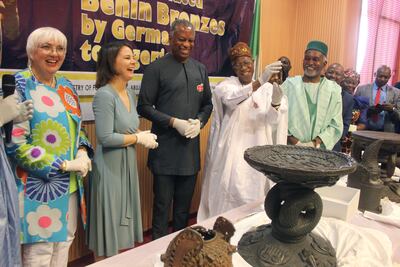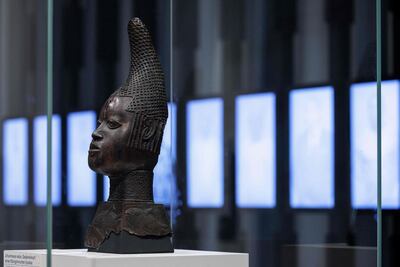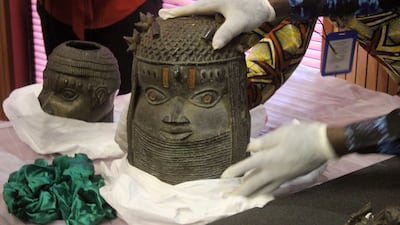More than 20 looted artefacts that are part of the Benin bronzes have been returned to Nigeria by the German government, 125 years after they were taken by British soldiers.
The move, the symbolic start of the bronzes being repatriated from Germany, was made as western European nations are forced to review how artefacts in national museums were collected, including cases of items the original country considers to be stolen.
German Foreign Minister Annalena Baerbock travelled to Nigeria's capital Abuja to personally hand over 21 objects, which included figureheads and other artefacts.
“What we are returning is a part of your history, what we are returning is a part of who you are,” Ms Baerbock said at the ceremony with Nigerian officials on Tuesday. “We are here to right a wrong.”
Thousands of 16th to 18th century metal plaques, sculptures and objects — regarded as some of the finest art in Africa — were ransacked by British forces from the ancient Kingdom of Benin, which is in modern-day Nigeria.
They ended up in museums and art collections across the US and Europe.

Germany acquired the world's second largest collection with more than 1,130 objects stored or displayed in its museums.
As part of a Nigerian-German agreement, Nigeria regains ownership of the bronzes but will continue to loan many of them to German museums, ensuring that some remain on display in Germany.
Cologne's Rautenstrauch-Joest Museum has 92 bronzes, 89 of which will stay on loan for the time being. Next year, 52 exhibits will be returned.

Many of the artefacts were taken in 1897, when a British military expedition attacked and destroyed Benin City, making off with thousands of metal and ivory sculptures and carvings.
A new online archive will provide a centralised hub of images and descriptions of more than 5,000 artefacts held in 131 institutions around the world.
The project, which began planning and research two years ago, was launched last month in Benin City, in southern Nigeria's Edo State, the heart of the former Benin Kingdom.
The Kingdom of Benin traces its roots back to the first century BC.
It expanded through military conquest and commerce, which with the arrival of Europeans in the 16th century developed into trade in slaves, ivory and spices.


